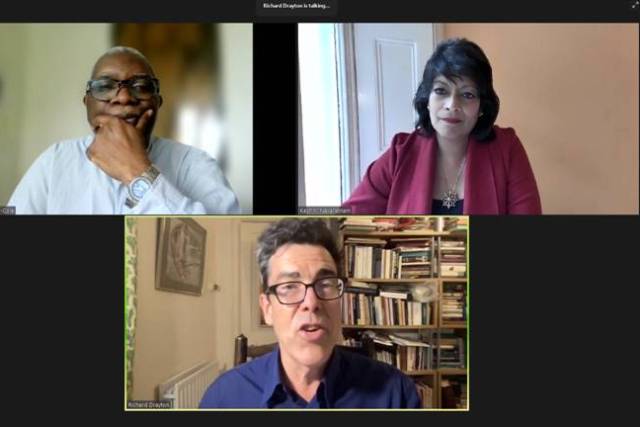 [top to bottom clockwise] Dr Reginald Cline-Cole, Keshini Navaratnam and Professor Richard Drayton.
[top to bottom clockwise] Dr Reginald Cline-Cole, Keshini Navaratnam and Professor Richard Drayton.
Can the Commonwealth Games 2022 be used to get brand Commonwealth into the minds of the next generation? This was one of the areas explored during a webinar on Decolonisation, Black Lives and the Commonwealth.
The 10 June event was the launch of a series entitled Decolonisation and Black Lives: The case of the UK and the Commonwealth. It has been organised by The Round Table: The Commonwealth Journal of International Affairs and the International Development Department at the University of Birmingham, with the support of the Association of Commonwealth Universities.
Speaker, Professor Richard Drayton, Professor of Imperial and Global History at King’s College, London, said that the 2022 Commonwealth Games would be a useful impetus for planning a strategy to produce a Commonwealth that meant something to a younger generation. Professor Drayton said that the organisation currently existed as an “historical thing” for younger people and he highlighted the need to discuss issues such as citizenship, making the Commonwealth progressive, and helping the body to deal with the problems which Commonwealth people deem to be important. The plan, he concluded, could be to bring the “strange word ‘Commonwealth’ into the everyday lives of schoolchildren”.
The event discussant was Dr Reginald Cline-Cole, Senior Lecturer at the Department of African Studies and Anthropology at the University of Birmingham. He said that a younger generation needed to be a part of re-defining the future of the Commonwealth. He said that, like families and organisations, the Commonwealth needed to be re-invigorated. He suggested that this discussion include all regions, including newer members such as Rwanda, to explore what values were important to a future Commonwealth. Dr Cline-Cole said that all Commonwealth institutions had to be more pro-active in looking at how the Commonwealth fits into “a world of enlarging entities”. He said that the Commonwealth had changed from its roots of empire but that it needed to explore how it fitted into today’s “unequal international order”. As an example of this order, he called the recently-announced apology and settlement for genocide from Germany to Namibia limited and “deeply unsatisfactory”.
Commonwealth evolution
Professor Drayton used the main part of his presentation to outline the evolution of the British Empire which had used race, religion and property as the basis for limiting democratic rights, into the modern multiracial Commonwealth of equal partners. He presented details of how racist ideologies and laws had been framed in the West Indies and in America and then later shared around the wider empire.
However, “The Commonwealth began to re-invent itself in the post-colonial world,” he said. He pointed to 1975-1990 Commonwealth Secretary-General Shridath Ramphal as “the secretary-general who had the largest presence on the international stage”. However, some of the older structures of empire have remained in place in the modern Commonwealth, particularly on the security, diplomatic and economic fronts. Professor Drayton said that “this Commonwealth system…is still attempting to negotiate its way in an unequal world”. He outlined the inequalities in the information, digital, and cultural worlds with the cultural legacies, such as museum artefacts and historical records, still in dispute and archive distribution still unequal. Moreover, “Who faces the hard end of the law …. who is likely to be given the loan,” he asked, attributing this structure of inequality based on racialised imaginaries to historical developments during the period of empire. “The social distribution of life chances remains unequal,” Professor Drayton said in concluding his presentation.
In the Q&A session with Round Table’s Keshini Navaratnam, Professor Drayton said that Britain had to be “dragged kicking and screaming” into post-war discussion on removal of the colour bar in British institutions. He said that the recent Windrush scandal had also highlighted that the UK was a “country still profoundly unequal in racialised ways”. He said that the Black Lives Matter movement had forced people to address issues which had “been looming for a long time”.
The 10 June event will be followed by further webinars. They will examine:
- the legacies of colonialism in the UK, particularly in the light of post-war immigration into Britain from the Commonwealth, and will ask whether the Commonwealth still has relevance and resonance for the current generation descended from earlier migrations;
- Whether the past, and the colonial inheritance, matters to the intergovernmental Commonwealth as it sets about developing international cooperation and creating more fair and equal societies and
- The variety of the Commonwealth’s colonial legacies around the world and the implications that these have for international understanding and cooperation.
Updated details on dates and participants will be shared on the Round Table’s Featured Event page and on Twitter @CWRoundTable.



